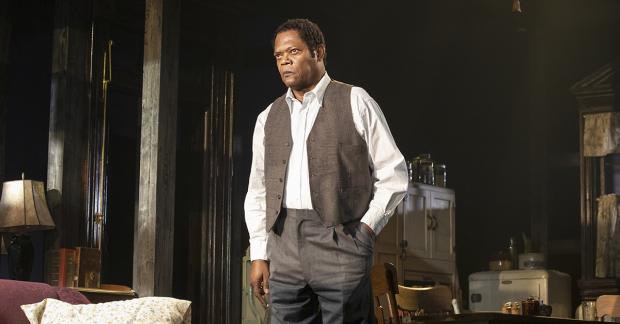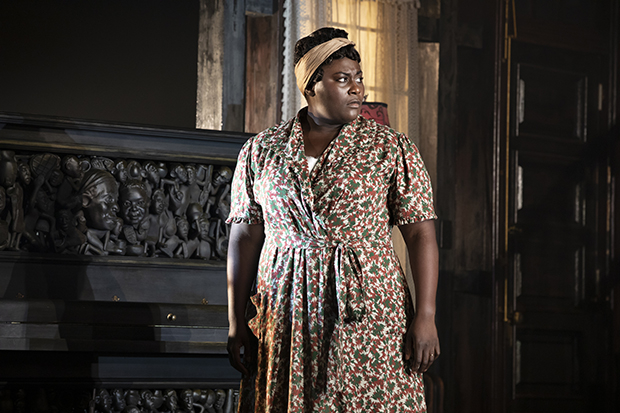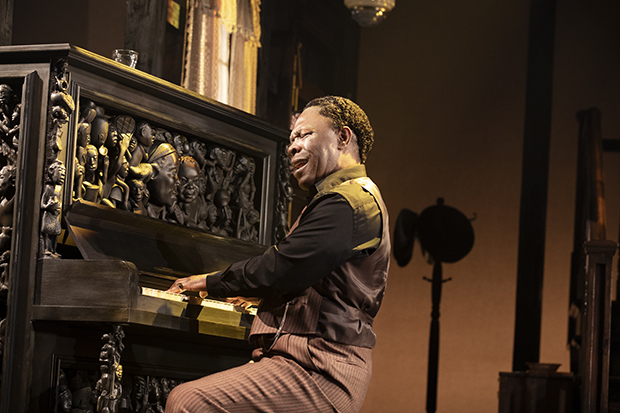Review: Samuel L. Jackson and Co. Hit the Right Notes in Low-Key Revival of The Piano Lesson
Director LaTanya Richardson Jackson leads the August Wilson classic back to Broadway.

(© Julieta Cervantes)
There are two kinds of revivals this season: the reimagined and the reverent. Where Death of a Salesman and 1776 dive into these well-trodden texts to reveal new layers of meaning, LaTanya Richardson Jackson's new Broadway production of August Wilson's The Piano Lesson at the Barrymore Theatre does quite the opposite. It lets the poetry of Wilson's Pulitzer-winning drama sing for itself, a radical act on its own in an era where most directors want us to feel their presence in every single moment. While it doesn't lead to the world's most dynamic staging, an un-futzed-with classic is awfully refreshing every now and then, and The Piano Lesson is a technically precise evening, if not the most exciting.
That Richardson Jackson is both a veteran Wilson interpreter as an actor and the first Black woman to direct one of his plays on Broadway no doubt adds to the veneration. So too does the fact that she was on the periphery when The Piano Lesson took shape at Yale Rep in 1987, a production that starred her husband, Samuel L. Jackson, as Boy Willie (he was the understudy upon the Broadway run in 1990). He graduates to the role of Uncle Doaker in this revival, and the couple's friend John David Washington (you know, Denzel's son) takes on Jackson's original role, giving the play a very distinct "keeping it in the family" feel. That meshes quite nicely with the overarching plot, which follows a family trying to figure out what to do with a priceless object that happens to be haunted by the ghosts of the past.
The heirloom is a piano, upon which the faces of the enslaved ancestors of the Charles family are carved. The instrument has lived with Doaker and his niece Berniece (Danielle Brooks) since Doaker and his two brothers, Wining Boy (Michael Potts) and the late Boy Charles, stole it from the Sutter plantation, the farm where their family was forced into labor.
As the play begins, Berniece's brother, Boy Willie, and his friend Lymon (Ray Fisher) have arrived from Mississippi, with Willie having the idea to sell the piano to buy the property on which their forebears worked. Berniece, on the other hand, wants to keep it, the piano symbolizing the one tangible link to their past. Doaker, meanwhile, feels the piano is imbued with the spirits of both his brother, who was burned up in a boxcar fire in retaliation for the theft, and plantation owner Sutter himself.

(© Julieta Cervantes)
The performers deliver Wilson's signature repartee in a way that makes it look easy (and they are beautifully costumed by Toni-Leslie James), if a little too broadly. Washington's youthful energy explodes throughout the room, a nice contrast to Brooks's simmering angst and Fisher's sweet goofiness. Off-Broadway vet April Matthis makes a three-course meal out of what's essentially a cameo as Boy Willie's date, and the ever-reliable Michael Potts delivers a typically impressive performance as Wining Boy that is at once boisterous and unsettled. Lest anyone think Jackson is merely a Hollywood action star, he burrows deep into a monologue about the Charles family history, with a delivery so evocative that we can practically see it come to life before us.
Richardson Jackson stages the play as a straight up ghost story. Supernatural projections (Jeff Sugg) swirl around Beowulf Boritt's set, the ornate and ramshackle skeleton of a Pittsburgh home in 1936. Japhy Weideman's foreboding lighting provides my favorite touch, the suggestion of bright yellow daylight transforming into the fiery orange of dusk and pitch dark of night. It all comes to a head in a climactic confrontation where living and dead battle for dominance.
This concept, built entirely on Wilson's context clues and direct instructions in the script, is a solid foundation, but it falls victim to the rudimentary nature of Richardson Jackson's staging. Despite the very good performances, there's no real tension, and the only real display of essential chemistry between them comes in a late-second act will they/won't they scene between Brooks and Fisher (as adorable as any potential romance). The pacing, meanwhile, is dirge-like throughout. The Piano Lesson is a long play as it is — just shy of three hours, including intermission — and you certainly feel it here.
I remember Signature Theatre's 2012 revival of The Piano Lesson being much more exhilarating, an edge-of-your-seat experience as opposed to this merely very nice one. Still, the opportunity to see a richly textured play delivered by actors who you can tell are having just the best time is a rare one, and while your overall enjoyment may vary, theirs is palpable across the footlights. Reveling in that splendor, with Wilson as our spirit guide, is worth its weight in gold.

(© Julieta Cervantes)









